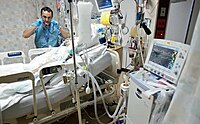
Photo from wikipedia
BACKGROUND In the modern US cardiovascular intensive care unit (CICU), the incidence of non-cardiovascular disorders has increased and non-cardiovascular disorders are associated with an increase in morbidity and mortality. In… Click to show full abstract
BACKGROUND In the modern US cardiovascular intensive care unit (CICU), the incidence of non-cardiovascular disorders has increased and non-cardiovascular disorders are associated with an increase in morbidity and mortality. In Japan, however, data regarding the association between non-cardiovascular disorders and outcomes in the CICU are limited. METHODS This study examined 490 consecutive admissions to a closed CICU at the Nippon Medical School Hospital from January to December 2017. Characteristics, diagnoses, treatments, and outcomes of admitted patients were identified. RESULTS The most common primary diagnosis was acute coronary syndrome (50.4%), followed by acute heart failure (20.0%), arrhythmia (6.7%), and non-cardiovascular diseases (3.7%). The mortality rate and median length of stay (LOS) in the CICU were 4.7% and 4 (interquartile range, 2-8) days, respectively. Of all patients, 42.2% (n = 207) developed non-cardiovascular complications such as acute respiratory failure, acute kidney injury, or sepsis during CICU stay. Multivariate logistic regression analysis revealed that acute respiratory failure and sepsis were significantly associated with mortality in the CICU (odds ratio, 11.014 and 25.678, respectively; both p<0.05). The multiple linear regression analysis showed that acute kidney injury was significantly associated with LOS in the CICU (β=0.144, p = 0.002). CONCLUSIONS Approximately half of patients admitted to the CICU had non-cardiovascular disorders including non-cardiovascular disease and non-cardiovascular complications, which were significantly associated with mortality and LOS in the CICU.
Journal Title: Journal of cardiology
Year Published: 2021
Link to full text (if available)
Share on Social Media: Sign Up to like & get
recommendations!